Loyalty is big business for airlines. In 2023, American Airlines raked in around $6.5 billion from AAdvantage alone — that included revenue earned from mileage redemptions with credit cards and marketing the program. Delta Air Lines reported deferred revenues of $8.4 billion from its SkyMiles program, and United Airlines had about $7.1 billion in deferred revenue from MileagePlus.
Besides revenue from tickets — actually flying people places — loyalty programs are one of the most significant revenue streams for an airline. These programs are so critical that some executives refer to them as a “north star.” United calls MileagePlus its “crown jewel.” At American’s investor day in March, CEO Robert Isom said around 65% of its revenue was driven by AAdvantage members.
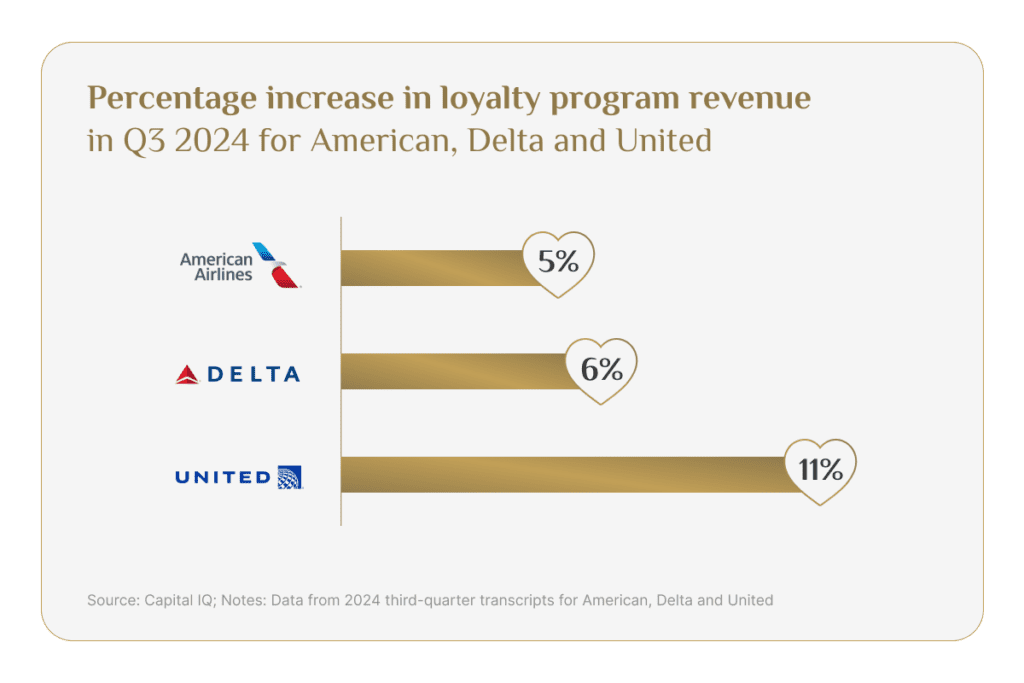
But now these cash cows have been under attack from all corners.
As airlines raise spending requirements to earn status, some passengers have begun to question if these programs are worth it.
“For a person who is interested in this, who enjoys the game, it can be a good deal,” said Ben Edelman, a frequent flyer based in Seattle who tracks consumer complaints in the airline industry and recently filed one with the Department of Transportation. “But for regular people, my own sense is it’s kind of stopped being a good deal.”
Edelman has noticed that it’s become more difficult to get redemptions for business class flights, and that for most people, loyalty programs require too much spending to reach status.
“The fundamental deal, how much you have to spend, how many flights you have to take to get how much benefit, that deal really isn’t being honored anymore,” Edelman said. “And a lot of people are kind of frustrated.”
The federal government had also been circling prior to the recent U.S. election. The DOT, the Justice Department and the Consumer Financial Protection Bureau all have inquiries into the loyalty programs for the four largest airlines. There are also two bills in Congress that seek to put more regulations on credit cards and points and miles.
Recently, the Senate declined to put the Credit Card Competition Act to a vote, with some senators believing that the bill would not pass Congress.
It’s likely that these initiatives will die down once President-elect Donald Trump takes office in January. The discontent among travelers will remain.
A Frustrating Experience
Edelman tried to use his AAdvantage miles to book business class flights from Washington, D.C. to Sydney for three relatives. He managed to find three award flights valued at 140,000 miles, plus taxes and fees of $112.20 per person.
However, American said those award flights would be delayed for three hours and then three hours became 27 hours. Eventually, Edelman’s relatives were downgraded from business class to economy.
“They say, ‘Wait, that’s not what we signed on for,’” Edelman said.
In his complaint with the DOT, Edelman, who has held Executive Platinum status with AAdvantage, cited inconsistent communication from American about the delay and availability of alternative award flights. Edelman said American “imposed a variety of restrictions” on alternative bookings.
“As a passenger redeeming frequent flyer miles, my relatives were redeeming my miles for business class,” he told Skift. “You’re kind of stuck with whatever the airline gives you. If they tell you you have to wait 25 hours or downgrade to coach, you kind of have to do that.”
Scores of travelers have taken to platforms like Reddit and Facebook to complain about these programs and have questioned if it’s worth pursuing status.
Some airlines are also betting they’ll see greater returns on tickets bought with cash rather than miles or upgrades, given the strong appetite for premium seating. During its investor day in November, Delta president Glen Hauenstein said the carrier’s first class cabin was once one of its “biggest loss leaders” because it was mostly available through upgrades.
Over 15 years ago, only around 12% of Delta’s first class seats were paid for — the rest of the cabin was filled by upgrades. Now, that number has flipped. First-class upgrades make up around 12% of Delta’s front cabin, and the rest of those seats are fully paid for.
Yet for all the scrutiny these programs have received from customers and Washington, they’re doing better than ever. Each quarter, the four biggest airlines have continued to report record revenues from their frequent flyer programs.
Inside the Loyalty Ecosystem
The first-ever loyalty program can be traced all the way back to the 18th century, when a merchant in Sudbury, New Hampshire offered customers tokens that could be redeemed for merchandise, according to a New York Times article from 1971.
But the concept of loyalty has become closely associated with the airline industry. Texas International Airlines — which soon merged with Continental Airlines — rolled out the first mileage-based frequent flyer program in 1979, according to The Points Guy.
Then, in 1981, American launched AAdvantage, and soon enough, United Airlines and Delta Air Lines followed suit.
Airlines may not be known to make much money, but their loyalty programs do. As carriers forge deals with credit card companies, they’ve been able to rake in even more revenue from the programs.
United MileagePlus has been valued at $22 billion, and AAdvantage is worth around $24 billion, according to the Harvard Business Review. Delta received $1.8 billion in the third quarter from its partnership with American Express, which includes a co-branded credit card that allows customers to earn miles without spending on airfare.
These programs have spawned a subculture of people obsessed with earning miles — ranging from business travelers to hobbyists. They have developed such a cult following that some points and miles pros book “mileage runs” for the sake of earning the next tier of status and sign up for all the right credit cards.
But as the programs have grown over the decades, airlines have made adjustments to their models. One of the biggest trends in the loyalty space has been the shift from mileage-based points to a spend-based model.
That spend-based model became a source of frustration in September 2023, when Delta released controversial changes to its SkyMiles program that made it much harder to earn status.
Experts say the shift to reward miles based on spending makes sense, when considering that airlines know how much revenue they are generating from each customer.
Jay Sorensen, an analyst at consulting company IdeaWorks, said in the 80s and 90s a mileage-based model worked because airlines didn’t necessarily know how much travelers spent on airfare since travel agents sold the majority of tickets.
“We didn’t know how much you paid,” Sorensen said. “And so miles were a sensible measurement. But as time progressed, the technological issue went away where airlines now know what revenue was produced by a customer immediately.”
Washington Examines Airline Consumer Practices
In September, the DOT officially launched an inquiry into the four largest U.S. loyalty programs — Delta SkyMiles, AAdvantage, United MileagePlus and Southwest Rapid Rewards.
“Our goal with this inquiry is to ensure that customer rewards are protected from any practices that would diminish their value, benefit, or availability,” Transportation Secretary Pete Buttigieg wrote in a letter dated September 5 to the four major U.S. carriers.
CFPB director Rohit Chopra said in May that the agency had found initial evidence of airlines and credit card companies devaluing miles. He said that airlines and credit card companies can “quickly and dramatically” devalue points by making them more difficult to redeem or limiting what items can be purchased with points.
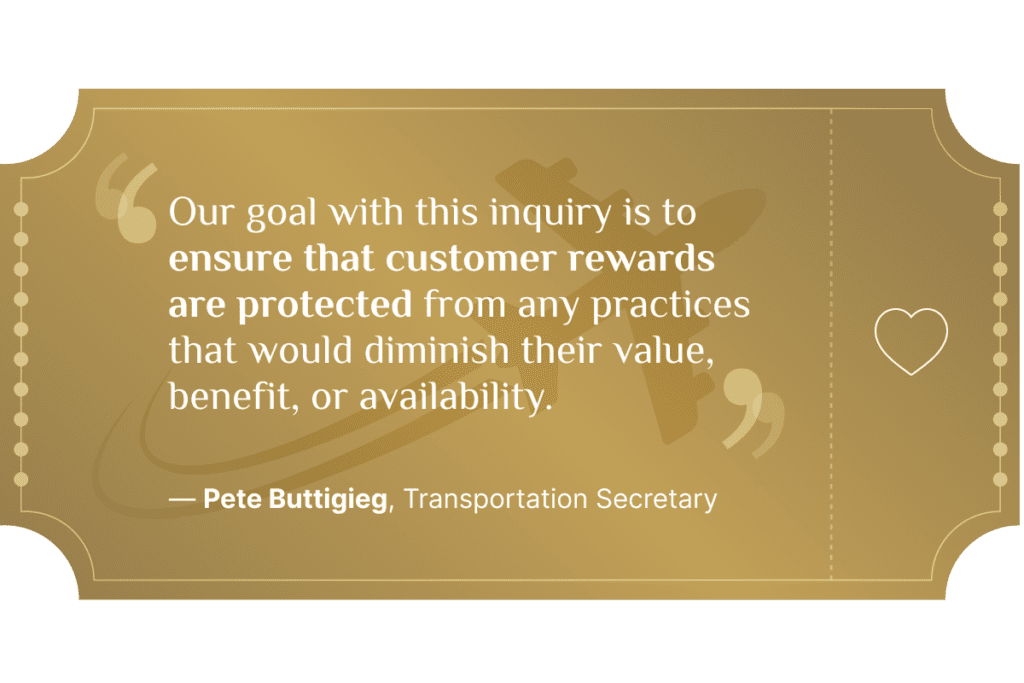
Devaluation of points and miles is routine in the industry. John Grant, a chief analyst at data firm OAG, said airlines tend to devalue miles as a way to remove some of the liabilities off their balance sheet.
“It’s a fine art,” Grant said. “You want people to travel and spend and then obviously the airline rewards them with points, but they don’t want all of those points to just sit there and then suddenly everyone calls on them in one month or one week.”
There has also been concern that loyalty programs have become so big that they crush competition, especially as American, Delta, United and Southwest dominate around 80% of the U.S. market.
In October, just weeks before the 2024 presidential election, the DOJ announced it was launching a “broad public inquiry” into the state of competition in air travel, and loyalty programs were also a part of that inquiry. In a 14-page questionnaire, the DOJ asked airlines how loyalty programs impact the ability of new carriers to enter the industry, if they create a monopoly, and how consolidation has impacted these programs.
Matt Klein, Spirit’s chief commercial officer, told the CFPB and DOT in May that loyalty programs were part of a “three-legged stool” that the four largest carriers use to hamper further competition.
“The larger airlines here in America now make it extremely difficult for low-fare airlines like Spirit to enter new markets, sustain long-term success when competing to and from the largest airports in this country, and provide better value to customers seeking alternative or lower cost options,” Klein said.
Airlines for America, the trade group that represents most major U.S. carriers, has said it believes there is robust competition among carriers, especially with loyalty programs.
“Because there is fierce competition among airlines for customers, loyalty programs are a way carriers can say ‘thank you’ to travelers,” A4A said in a statement to Skift. “Millions of people enjoy being a part of various loyalty programs, which allow them to accumulate rewards to apply toward travel or other benefits.”
‘It’s Just Math’
For airlines, there’s a rationale to the changes.
Luc Bondar, the chief operating officer of United MileagePlus, told Skift that a major reason why United changes the status requirements for MileagePlus is partly to ensure the program can provide a consistent level of service to those with elite status.
“It’s on us to make sure that value is consistent,” Bondar said. “And by consistent, I don’t mean always the same, but I mean that the customer has a strong sense that the investment of time and effort and money that they make with a brand like United they’re going to see come back to them through their relationship with MileagePlus.”
Bondar said if the higher status levels have too many members, it becomes more difficult for United to deliver on the perks it promises.
“If the premier program grows too large and we have capacity–constrained benefits like upgrades and priority boarding and elevated levels of service, then we end up with an imbalance,” Bondar said. “It makes it harder for us to deliver a great experience to the customer.”
United recently rolled out changes to its status requirements for MileagePlus in 2025, increasing the spending thresholds to reach most of United’s status tiers by 20% to 25%.
“It’s just math that helps inform where these thresholds should be set to optimize for the demand that we have for our product and our ability to serve a great product,” Bondar said.
The most common ways to reach status are either through the number of flights taken and the amount spent, or just purely through spending, which can be done with a co-branded credit card. However, United, unlike American and Delta, require customers to fly some United flights to qualify for status.
“Some of our competitors have gone further in this space,” Bondar said. “We first and foremost never forget the importance of the fact that we’re a frequent flyer program and we reward our travelers and we want our customers to get on our planes.”
Travelers Look Elsewhere for Redemptions
One popular trend among some frequent flyers is finding cheaper redemptions on international airlines and applying those to their U.S. partners.
During an October event in Manhattan for Air Canada’s Aeroplan, Clint Henderson, a managing editor at The Points Guy, said he felt as if it’s hard to find good redemptions on U.S. airlines.
“I’m increasingly looking outside the U.S. market for really good redemptions in business class for under a hundred dollars,” he said. “And I’m just not finding that these days with American, generally with Delta, especially. Even United has been tough to find. So I think having other options like a real plan is a great strategy for U.S. consumers.”
Scott O’Leary, the vice president of loyalty and product for Air Canada, told Skift that the frequent flyer program has seen an uptick in activity and sign-ups from U.S. customers.
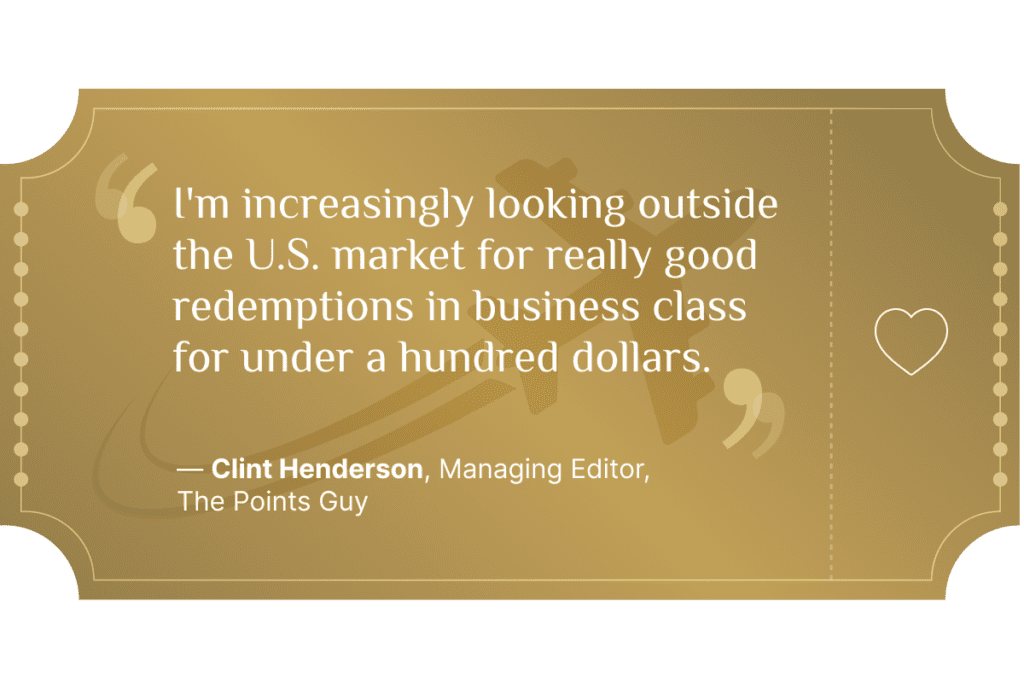
“Many of our U.S.-based members are seeing value in Aeroplan beyond what they’re enjoying in their major U.S. airline programs that they also participate in,” he said. “And that’s especially when it comes to international travel plans.”
Bondar said he believed MileagePlus had certain perks that other international programs couldn’t compete with, adding that points on international programs tend to have expiration dates and some charge change or cancellation fees for award flights.
So Are Frequent Flyer Programs Worth It?
While some may be disillusioned with the state of U.S. loyalty programs, many points and miles experts said they still believed these programs had value for most consumers, even those who don’t fly frequently.
Sally French, a lead travel writer for points and miles website NerdWallet, said earning points through a loyalty program is similar to saving money in a bank account. She noted that airline miles are more valuable today than they have been in recent years.
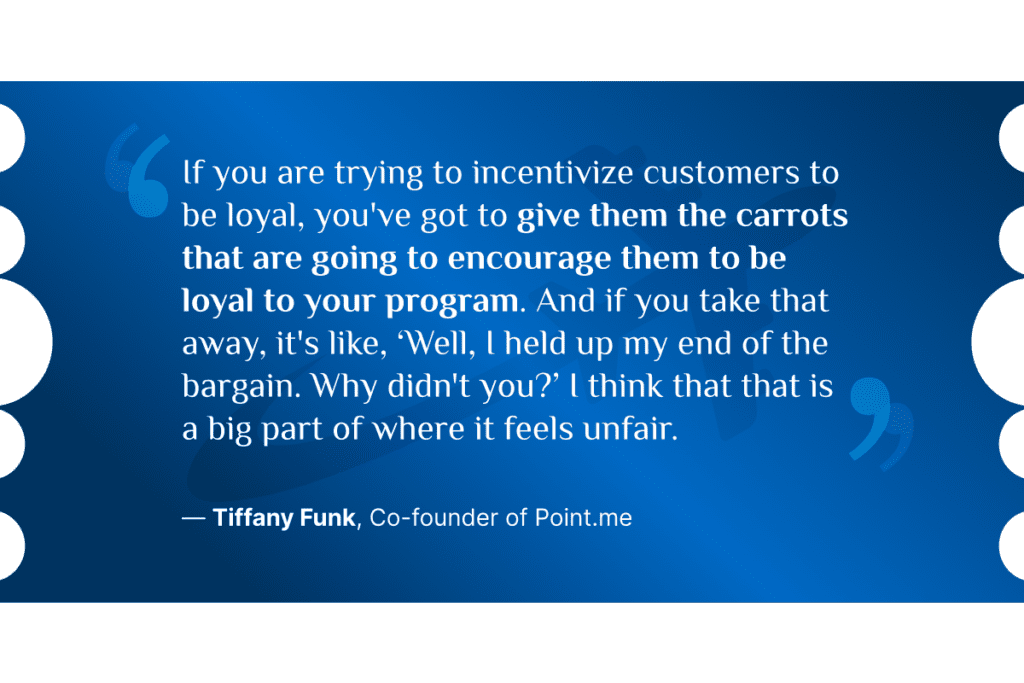
“The reality is we’ve found that these programs are becoming better over time,” French said. “Sure, there have been complaints with them, but we’ve seen a lot of programs self-regulate to reduce those complaints. For example, with points and miles expiring, we’ve seen less and less of that.”
Tiffany Funk, a co-founder of the startup Point.me, said she believes most customers don’t entirely comprehend the amount of spending that is required to earn status or redeem a flight.
“If you are trying to incentivize customers to be loyal, you’ve got to give them the carrots that are going to encourage them to be loyal to your program,” Funk said. “And if you take that away, it’s like, ‘Well, I held up my end of the bargain. Why didn’t you?’ I think that that is a big part of where it feels unfair.”
Funk has also noticed an increase in the number of miles required to redeem award flights.
“Exactly 10 years ago, I was living abroad,” she said. “We lived in Italy and a round-trip business class ticket, if you were good at using miles, was about 80,000 points. That was with Delta SkyMiles. Now I would expect to spend about 110,000, if you’re good at points.”
Sarah Dye, the founder of a Facebook community called “Travel on Points,” said that she believed status had lost some of its sheen, since so many travelers have it.
“I think that status in general has been devalued and there’s way more people that have status than ever before,” Dye said. “I don’t necessarily know what I would want it to look like going forward but I think the way it’s marketed to consumers should be representative of the actual benefit that it bestows.”
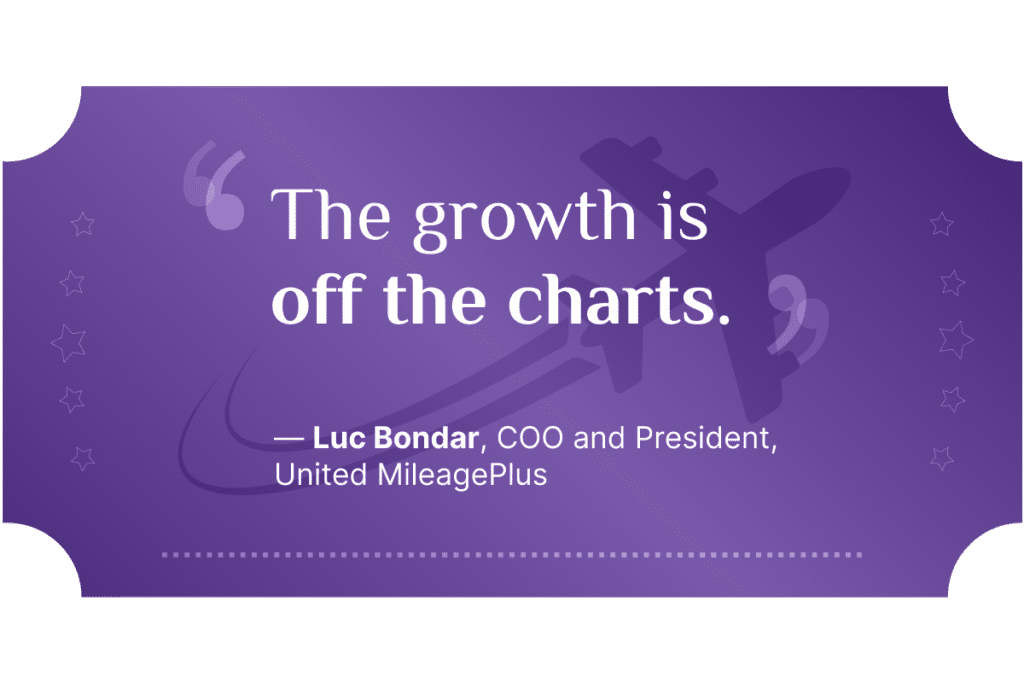
Bondar said that MileagePlus aims to also create some value for those who don’t travel frequently. The carrier allows customers to purchase fares using a combination of points and cash, for example.
“The growth that we’ve seen in money plus miles year-over-year is absolutely huge,” he said. “The growth is off the charts in terms of the customer demand and well over a third of every money plus miles transaction is from members with low balances, members who historically would have looked at what they have and say, ‘I can’t do anything with this.’”
Edelman said he believed airlines should add more disclosures to their loyalty program to clarify a customer’s ability to get a solid redemption.
“I don’t remember that the Department of Transportation’s role or goal is to make it easy, but if the airlines wanted to make it easy, they’ve sure gone in the opposite direction from that,” he said.
